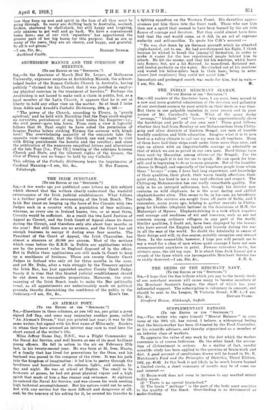THE INDIAN MERCHANT SEAMAN.
[To THE EDITOR OF THE " SPECTATOR."] S13,—All readers of the Spectator have, I am sure, been moved to a new and more grateful admiration of the devotion and gallantry of our merchant seamen by your article on their deeds in war time. But there is one palpable omission in your record and in your review of Mr. Cornford's book. What of the many dusky " serangs," " khalasis " and " lasears " who unpretentiously share the hardships and perils of our own men ? These good fellows, whether they hail from Bombay or are Mohammedans from Chitta- gong and other districts of Easteru Bengal, are men of humble worldly condition and little education. Imagine what it is to men bred in a sultry climate to sail our icy seas in all weathers. Many of them have had their ships sunk under them more than once, and sign on afresh with an imperturbable courage as admirable as that of which we are so proud in our own men. Hard things have been said—by Macaulay, among others—of the Bengali. For the educated Bengali it is not for me to speak. He can speak for him- self, and is beginning to do so to some purpose. But of the humbler classes in Bengal, and especially of the longshore people from whom these "lasers " come, I have had long experience, and knowledge of their qualities, their pluck, their warm family affections, their quiet piety, has bred in me a very real affection and respect. The Chittagong Mohammedan has one really remarkable quality. Not only is he an intrepid sailorman, but, though his district now contains no wild elephants, he is the most daring and skilful elephant-hunter alive. This seems to be, in his came, an hereditary aptitude. His services are sought from all parts of India, and I remember, many years ago, helping to gather recruits in Chitta- gong for kheddas (elephant battues) in the dominions of H.H. the Maharajah of Mysore. Elephant-driving is a task which requires cool courage and readiness of wit and resource, such as are not common among ordinary villagers in any part of the world. Similar qualities, I doubt not, have been displayed by the Itracars who have served the Empire loyally and bravely during the war in all the seas of the world. No doubt the Admiralty is aware of their doings and will, in due course, suitably recognize and reward them. In the meanwhile, however, I hope you will permit me to say a word for a class of men whose quiet courage I have not seen commemorated anywhere in print. Famam estendere factis, hoc virtutis opus, the old tag says. It is about time Jack Lascar got a crumb of the fame which our incomparable Merchant Service has 90 richly deserved.—I am, Sir, &c., J. D. A.


























 Previous page
Previous page